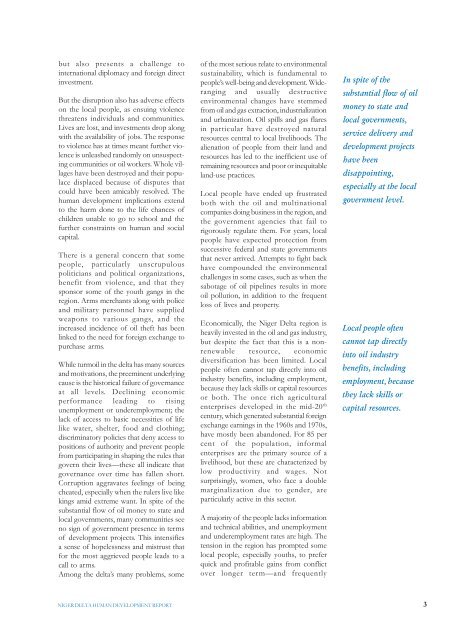Niger Delta Human Development Report - UNDP Nigeria - United ...
Niger Delta Human Development Report - UNDP Nigeria - United ...
Niger Delta Human Development Report - UNDP Nigeria - United ...
Create successful ePaper yourself
Turn your PDF publications into a flip-book with our unique Google optimized e-Paper software.
ut also presents a challenge to<br />
international diplomacy and foreign direct<br />
investment.<br />
But the disruption also has adverse effects<br />
on the local people, as ensuing violence<br />
threatens individuals and communities.<br />
Lives are lost, and investments drop along<br />
with the availability of jobs. The response<br />
to violence has at times meant further violence<br />
is unleashed randomly on unsuspecting<br />
communities or oil workers. Whole villages<br />
have been destroyed and their populace<br />
displaced because of disputes that<br />
could have been amicably resolved. The<br />
human development implications extend<br />
to the harm done to the life chances of<br />
children unable to go to school and the<br />
further constraints on human and social<br />
capital.<br />
There is a general concern that some<br />
people, particularly unscrupulous<br />
politicians and political organizations,<br />
benefit from violence, and that they<br />
sponsor some of the youth gangs in the<br />
region. Arms merchants along with police<br />
and military personnel have supplied<br />
weapons to various gangs, and the<br />
increased incidence of oil theft has been<br />
linked to the need for foreign exchange to<br />
purchase arms.<br />
While turmoil in the delta has many sources<br />
and motivations, the preeminent underlying<br />
cause is the historical failure of governance<br />
at all levels. Declining economic<br />
performance leading to rising<br />
unemployment or underemployment; the<br />
lack of access to basic necessities of life<br />
like water, shelter, food and clothing;<br />
discriminatory policies that deny access to<br />
positions of authority and prevent people<br />
from participating in shaping the rules that<br />
govern their lives—these all indicate that<br />
governance over time has fallen short.<br />
Corruption aggravates feelings of being<br />
cheated, especially when the rulers live like<br />
kings amid extreme want. In spite of the<br />
substantial flow of oil money to state and<br />
local governments, many communities see<br />
no sign of government presence in terms<br />
of development projects. This intensifies<br />
a sense of hopelessness and mistrust that<br />
for the most aggrieved people leads to a<br />
call to arms.<br />
Among the delta’s many problems, some<br />
of the most serious relate to environmental<br />
sustainability, which is fundamental to<br />
people’s well-being and development. Wideranging<br />
and usually destructive<br />
environmental changes have stemmed<br />
from oil and gas extraction, industrialization<br />
and urbanization. Oil spills and gas flares<br />
in particular have destroyed natural<br />
resources central to local livelihoods. The<br />
alienation of people from their land and<br />
resources has led to the inefficient use of<br />
remaining resources and poor or inequitable<br />
land-use practices.<br />
Local people have ended up frustrated<br />
both with the oil and multinational<br />
companies doing business in the region, and<br />
the government agencies that fail to<br />
rigorously regulate them. For years, local<br />
people have expected protection from<br />
successive federal and state governments<br />
that never arrived. Attempts to fight back<br />
have compounded the environmental<br />
challenges in some cases, such as when the<br />
sabotage of oil pipelines results in more<br />
oil pollution, in addition to the frequent<br />
loss of lives and property.<br />
Economically, the <strong>Niger</strong> <strong>Delta</strong> region is<br />
heavily invested in the oil and gas industry,<br />
but despite the fact that this is a nonrenewable<br />
resource, economic<br />
diversification has been limited. Local<br />
people often cannot tap directly into oil<br />
industry benefits, including employment,<br />
because they lack skills or capital resources<br />
or both. The once rich agricultural<br />
enterprises developed in the mid-20 th<br />
century, which generated substantial foreign<br />
exchange earnings in the 1960s and 1970s,<br />
have mostly been abandoned. For 85 per<br />
cent of the population, informal<br />
enterprises are the primary source of a<br />
livelihood, but these are characterized by<br />
low productivity and wages. Not<br />
surprisingly, women, who face a double<br />
marginalization due to gender, are<br />
particularly active in this sector.<br />
A majority of the people lacks information<br />
and technical abilities, and unemployment<br />
and underemployment rates are high. The<br />
tension in the region has prompted some<br />
local people, especially youths, to prefer<br />
quick and profitable gains from conflict<br />
over longer term—and frequently<br />
In spite of the<br />
substantial flow of oil<br />
money to state and<br />
local governments,<br />
service delivery and<br />
development projects<br />
have been<br />
disappointing,<br />
especially at the local<br />
government level.<br />
Local people often<br />
cannot tap directly<br />
into oil industry<br />
benefits, including<br />
employment, because<br />
they lack skills or<br />
capital resources.<br />
NIGER DELTA HUMAN DEVELOPMENT REPORT 3










